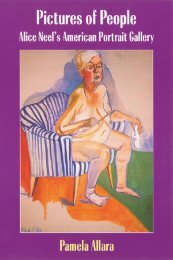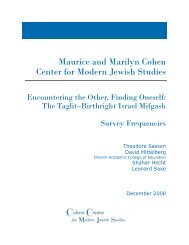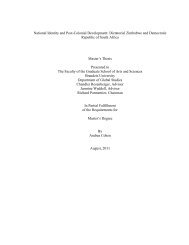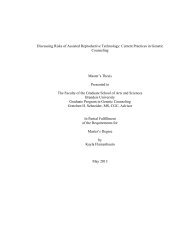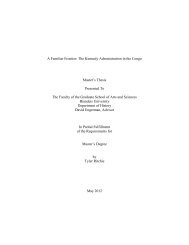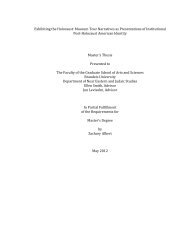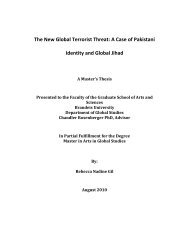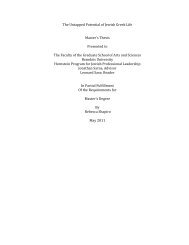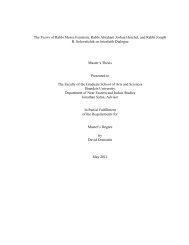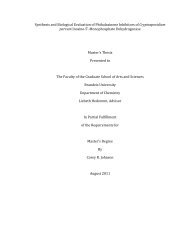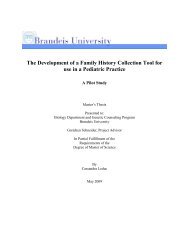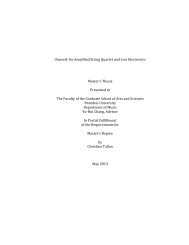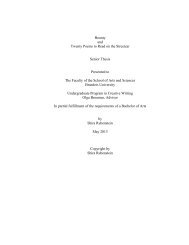Ezra Taft Benson and the State of Israel - Brandeis Institutional ...
Ezra Taft Benson and the State of Israel - Brandeis Institutional ...
Ezra Taft Benson and the State of Israel - Brandeis Institutional ...
- No tags were found...
Create successful ePaper yourself
Turn your PDF publications into a flip-book with our unique Google optimized e-Paper software.
up largely <strong>of</strong> various Christian reports on <strong>the</strong> <strong>State</strong> <strong>of</strong> <strong>Israel</strong>, mostly from <strong>the</strong> year 1949,just after <strong>the</strong> Jewish <strong>State</strong> was born. It does include a 1951 pamphlet (on micr<strong>of</strong>ilm)from <strong>the</strong> American Zionist Council, “<strong>Israel</strong> <strong>and</strong> <strong>the</strong> Arab <strong>State</strong>s: <strong>the</strong> Issues in Dispute,”<strong>and</strong> a lengthy article, “The Jerusalem Story,” published in 1949 in <strong>the</strong> magazine TheNation, which details <strong>the</strong> problems confronting <strong>the</strong> UN in establishing proprietorshipover Jerusalem. Notably, <strong>the</strong> literature includes nothing from an Arab perspective on <strong>the</strong>Jewish <strong>State</strong>, an aspect <strong>of</strong> <strong>Benson</strong>'s political views that will be discussed later.What is relevant <strong>and</strong> interesting here is that <strong>the</strong> bulk <strong>of</strong> <strong>Benson</strong>'s “JewishLiterature,” is actually Christian Zionist reports on <strong>the</strong> fledgling state. He was clearlyaware <strong>of</strong> Christian (or certain Christian groups') appreciation for <strong>the</strong> miracles “takingplace before <strong>the</strong>ir eyes.” Yet his impression was one <strong>of</strong> general disregard for thosemiracles among spiritual leaders. Perhaps this is due to <strong>the</strong> notion that <strong>the</strong> Mormonperspective, while shared by some Christian groups, was unique. In his 1976 message,<strong>Benson</strong> addresses this: “There were a number <strong>of</strong> Christian sects in <strong>the</strong> nineteenth centurywhich held millennial views <strong>and</strong> saw <strong>the</strong> return <strong>of</strong> <strong>the</strong> Jews to <strong>the</strong>ir homel<strong>and</strong> as a 'sign <strong>of</strong><strong>the</strong> times' which would precede <strong>the</strong> second advent <strong>of</strong> <strong>the</strong> Jesus Christ.” Yet, he stresses,“<strong>the</strong> Mormon interest was <strong>and</strong> is more than this. Our concern <strong>and</strong> interest is a kinship toour Jewish bro<strong>the</strong>rs.” 83For <strong>Benson</strong>, <strong>the</strong>n, Mormons boasted a singular relationship with<strong>the</strong> Jews.His perception was likely also influenced by <strong>the</strong> apparent ambivalence inAmerican opinions regarding a homel<strong>and</strong> for <strong>the</strong> Jewish people in Palestine. Variousstudies have examined American attitudes, including <strong>and</strong> especially Christian attitudes,83<strong>Benson</strong>, “Message to Judah,” 4-5.31



